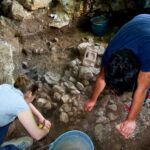PhD Research Grant in Prehistoric Archaeology
PhD Research Grant in Prehistoric Archaeology
Topic: Lost coastal territories: Searching and mapping Late Palaeolithic and early Mesolithic coastal landscapes and sites under water and land (DC2)
Call: HORIZON-MSCA-2022-DN-01-01 (Marie Skłodowska-Curie Actions, Doctoral Networks)
Deadline for the applications: February 4th, 2024
Legal requirements:
- MA Degree in Archaeology Geology, Geomorphology, Geography, Oceanography or Coastal Engineering
- Applicants should be eligible to be admitted in the Programa de Doctorado en Arqueología Prehistórica (Escuela de Doctorado de la Universidad de Cantabria) during the academic year 2024-2025
- Applicants should not be in possession of a doctoral degree at the date of the recruitment
- All applicants recruited in a DN must be doctoral candidates (i.e. not already in possession of a doctoral degree at the date of the recruitment)
- MSCA Mobility Rule: Applicants of any nationality are accepted but must not have resided or carried out their main activity (work, studies, etc.) in Spain for more than 12 months in the 36 months immediately before their date of recruitment
Centre: Universidad de Cantabria. Instituto Internacional de Investigaciones Prehistóricas de Cantabria (Santander, Spain)
Duration: 3 years (September 2024 to August 2027)
Salary: 3 104.20 € per month/ 37 250.40 € per year (plus mobility allowance and, if applicable, family allowance)
General information on the DN ArCHe:
The Doctoral Network ArCHe (https://www.arche.uio.no/) will train 10 PhD fellows for increasing the scientific and public value of Europe’s archaeological coastal heritage, focusing on the legacy of Stone Age hunter-fisher-gatherers (c. 12,000–2000 calBC). Including some of the earliest remains of human activity, this fragile and very heterogeneous legacy is crucial for understanding human engagement with the coast. Today, it is embedded in a variety of geographic settings across Europe, differing in environmental development, which face massive environmental and human threats, and is approached in various ways in cultural heritage management. ArCHe addresses the challenges of this fractured field with an innovative past–present–future approach focused on connecting the legacy from the past, its present status as archaeological heritage and prospects for its future protection and integration into lived landscapes. With six beneficiaries and nine associated partners, ArCHe unites academic research centres and non-academic organizations (cultural heritage sector, specialist organisations, museums and media). Within this joint platform for research and training, customized PhD projects will allow for cross-fertilization of knowledge among researchers and partners through scientific courses, workshops, conferences, applied secondments and transferable skills tuition. Training in archaeology, anthropology, critical heritage studies, heritage management, bioarchaeology, geology, oceanography, coastal engineering/preservation and communication relevant to coastal heritage and environment will equip the ArCHe PhDs with advanced interdisciplinary and cross-regional knowledge and skills applicable to various academic and non-academic fields across Europe. Through best practices, the PhD projects will contribute to the visibility, preservation and sustainable integration of the vulnerable cultural heritage in coastal areas facing global environmental and development challenges.
Project description:
A third of the land area occupied by Paleolithic human groups in Europe was drowned by the sea level rise after the Last Glacial period and the coastal settlements of Paleolithic hunter-gatherer groups are today placed below current sea level. The first goal of PhD2 is to explore the feasibility of identifying and analysing archaeological remains from these periods left on the Continental Shelf floor of Atlantic Europe, a matter still unexplored. Multidisciplinary research focusing on new technological approaches such as Topas sub-bottom profiling, multibean echosounder or XRF core scanning makes this possible and might trigger a real revolution in the knowledge of Prehistory. Brittany, Aquitaine, northern Spain and Estremadura and Alentejo in Portugal are targets to address this issue from a comparative approach. The continental shelf of Atlantic Europe holds some particularly promising features: 1) In some areas (e.g. Cantabria, Aquitaine, Alentejo) the density of the hunter-gatherers’ settlements near the current coastline is among the highests in Europe, suggesting the existence of a much larger network of settlements reaching out on the now flooded shelf. 2) In northern Spain and Portugal, the narrowness of the continental shelf reduces the area to be explored and places the prehistoric sites at short distance from the modern coastline, more accessible for survey. 3) In some areas with a sub-seafloor karst, archaeological sites that are similar to the well-known cave and rockshelter sites known from today’s inland might exist. PhD2 will undertake multidisciplinary searches of places in the selected regions to locate evidence of prehistoric human activity using ROVs and scuba diving techniques. Advanced digital mapping and environmental reconstruction techniques will be applied to identify and investigate locations prone to human settlement, to study of the landscape and coastline evolution, and the environmental setting of the hunter-gatherer’s groups. As another goal, the new results from Atlantic Europe will be compared to the situation in Norway, where Late Paleolithic and Mesolithic sites are preserved on dry ground. Similarities and differences in Stone Age land-use in these regions will be discussed. Thirdly, PhD2 will strongly contribute with new insights to the preservation of the coastal and submerged archaeological heritage, and will provide a powerful instrument for the future management policies.
Expected Results:
1) Detailed analysis of the evolution of the sea level in the Atlantic areas studied. 2) Localization of submerged Stone Age sites. 3) Spatial analysis of the late Paleolithic and the Mesolithic settlement of the selected region, including currently emerged sites. 4) Analysis of the diachronic evolution of the human activity in a coastal region from the Magdalenian to the transition the Neolithic. 5) A comparison of a Norwegian and an Atlantic region. 6) Catalogue of coastal and submerged sites and risk maps. 7) Improvement of the methodology for underwater survey and recording of Stone Age sites. 7) Contribution to the creation of a good-practices code for the analysis and preservation of coastal and submerged sites. 8) Definition of criteria for heritage management in coastal areas and the continental shelf.
Academic secondments:
Brest (CNRS-Institut écologie et environnement; supervisor: Pierre Stéphan): three months; purpose: analysing the Mesolithic sites and the submerged paleoenvironment of Brittany. Oslo (Museum of Cultural History, University of Oslo; supervisor: Almut Schülke): two months; purpose: comparative study of Mesolithic settlement patterns in Norway
Non-academic secondments:
Santander (FIHAC; supervisor: Javier López Lara): one month; purpose: training in coastal engineering. Saint-Malo (ADRAMAR; supervisor: Anne Hoyau-Berry): one month; purpose: learn about NGOs and underwater archaeological survey
Main supervisor: Prof. Pablo Arias (Universidad de Cantabria
Co-supervisors: Dr. Camilo Jaramillo (IH Cantabria) and Dr. Pierre Stéphan (CNRS)
Applications should be sent to the following address: SimTIC@unican.es
Documents to be sent in by the applicants:
- Application Form
- Letter of motivation
- Project proposal (approximately 14,000 characters including spaces, references in addition) describing how the candidate would approach the given PhD-topic, including substantial reflections (not more than 4,200 characters including spaces) on how the specific PhD-project topic will contribute to achieving the general aims of the Doctoral network ArCHe as described on the ArCHe homepage (https://www.arche.uio.no/). A progress plan should be included.
- CV (summarizing education, positions and academic work)
- Complete list of publications and academic works
- Proof of language proficiencies. Given that the project is conducted in English, possession of a high level of proficiency in that language (minimum B2) is a mandatory requirement
- Two reference persons to be contacted by the selection committee (name, relation to candidate, e-mail address and phone number)
- Copy of MA degree diploma(s) and academic transcripts
- Applicants may be asked to submit their Master’s theses or further information later
Selection criteria:
- Scientific excellence to fit the PhD project including the comparative ArCHe-perspective: international, interdisciplinary, intersectoral and with a past-present-future perspective.
- Fluent (oral and written) English skills as the project operates in English language.
- Fluency in Spanish is not required, but can be considered a merit
- Interdisciplinary knowledge
- Regarding the project proposal:
- Originality, independent thinking
- Knowledge of the state of the art and how the applicant goes beyond this
- Theoretical and methodological foundation
- Scientific ambition and innovativeness
- Feasibility and progress plan
- Suitability of the proposal not least in terms of the Doctoral network thought, and specifically regarding to ArCHe
- Ethics implications
All of the above are assessed based on submitted documentation and the interview. In addition, the following soft skills are assessed during the interview:
- High motivation for doing their PhD in a MSCA-Doctoral network, and specifically ArCHe
- Flexibility
- Team-mindedness
- Previous training or experience in the specific academic knowledge and skills (see above)





